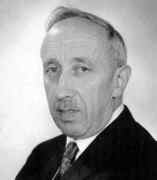Person: Vajda, Steven

Steven Vajda was a Hungarian mathematician who played an important role in the development of mathematical programming and operational research.
Mathematical Profile (Excerpt):
- His parents, who were both born in Vienna, were Josef Vajda and Aurelia Wollak.
- He was known at this time as Stefan Vajda and some friends continued to use this version of his name.
- After graduating from the Akademisches Gymnasium, Vajda enrolled an engineering course in the Vienna Technical University.
- Employment was very hard to find and, indeed, Vajda was unable to find a job after completing the actuarial course so he decided to continue his education and enrolled to study for a mathematics degree at the University of Vienna.
- Having completed a 3-year degree, Vajda remained at the University of Vienna undertaking research for his doctorate.
- After the award of his doctorate, Vajda spend one semester at Göttingen attending lectures by David Hilbert, Richard Courant, Emmy Noether, Bartel van der Waerden and others.
- Returning to Vienna, Vajda was still unable to obtain a job but van der Waerden was able to direct him towards an actuarial position in Braila, Romania.
- These years in Vienna were ones in which Vajda joined in the high level of intellectual activity which was taking place in that city.
- As well as being influenced by members of this group, Vajda also became friendly with Karl Popper who was studying philosophy and psychology in Vienna.
- Vajda contacted him and Popper was able to arrange for Vajda to be offered a position in New Zealand.
- Vajda coming from Vienna was now an enemy alien so he could not continue with his plans to go to New Zealand but was sent to an internment camp on the Isle of Man.
- After six months in the internment camp, during which time he taught mathematics in a makeshift university that the refugees had set up, the authorities realised that Vajda was not a danger to the British and he was released.
- In 1944, when the Admiralty was setting up a new department of statistics to work on methods of maximising their use of resources in the war in the Pacific, Vajda was an obvious person to invite to join them.
- In 1949 Vajda became assistant director of operational research for the Admiralty, becoming head of the Mathematics Group at the Admiralty Research Laboratory at Teddington in 1952.
- In 1965, at the age of sixty-four, Vajda retired from the Admiralty but he was appointed as Professor of Operational Research at the University of Birmingham.
- At an age when most people are about to retire, Vajda was beginning his academic career.
- Although formally Vajda was about to begin a university career in 1965, he had already published a number of books on the topics for which he has become famous, namely the Theory of Games and Linear Programming.
- At Sussex, Vajda became a colleague of Walter Ledermann who, although ten years younger, had suffered similar wartime experiences.
- Ledermann and Vajda jointly edited most of the core volumes in the Handbook of Applicable Mathematics series.
- Vajda received many honours for his contributions.
- Not even the extremely hot weather in Israel in July 1995 discouraged Steven from taking part in the physically demanding 2-days' excursion to Galilee organized in conjunction with EURO XIV conference.
- Those gifts were granted to Steven Vajda, still teaching and writing in his 94th year before he passed away after a short illness ...
Born 20 August 1901, Budapest, Hungary. Died 10 December 1995, Brighton, Sussex, England.
View full biography at MacTutor
Tags relevant for this person:
Origin Hungary
Thank you to the contributors under CC BY-SA 4.0! 

- Github:
-

- non-Github:
- @J-J-O'Connor
- @E-F-Robertson
References
Adapted from other CC BY-SA 4.0 Sources:
- O’Connor, John J; Robertson, Edmund F: MacTutor History of Mathematics Archive
